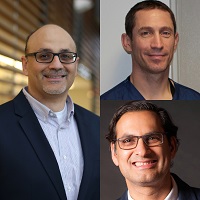The Kingston Kidney Transplant Team (KKTP) is a Health Canada-accredited adult kidney transplant program. Associate professor of Medicine and transplant Nephrology at Queen’s and Medical Director for the KKTP Dr. M. Khaled Shamseddin says, “The KKTP is one out of six Ontarian transplant programs enabling adult patients with advanced kidney disease to easily access both deceased and live donor kidney transplantation.” The KKTP team was awarded the 2018 SEAMO Leadership Award as a result of outstanding patient care and outcomes. “With a focus aimed on expanding live donor kidney donation/pre-emptive transplantation (transplantation prior to dialysis initiation), the KKTP will join the Canadian National Kidney Paired Donation (KPD) program in early 2022,” Dr. Shamseddin says. “As part of the KPD, the KKTP would be able to enhance patients’ access to donation and transplantation and would allow for shipping and importing living donor kidneys, thus permitting potential living kidney donors to donate their kidneys locally rather than traveling to the recipient’s centre.”
at Queen’s and Medical Director for the KKTP Dr. M. Khaled Shamseddin says, “The KKTP is one out of six Ontarian transplant programs enabling adult patients with advanced kidney disease to easily access both deceased and live donor kidney transplantation.” The KKTP team was awarded the 2018 SEAMO Leadership Award as a result of outstanding patient care and outcomes. “With a focus aimed on expanding live donor kidney donation/pre-emptive transplantation (transplantation prior to dialysis initiation), the KKTP will join the Canadian National Kidney Paired Donation (KPD) program in early 2022,” Dr. Shamseddin says. “As part of the KPD, the KKTP would be able to enhance patients’ access to donation and transplantation and would allow for shipping and importing living donor kidneys, thus permitting potential living kidney donors to donate their kidneys locally rather than traveling to the recipient’s centre.”
Dr. Shamseddin says kidney transplantation is a multidisciplinary service that requires major collaboration among several specialties and subspecialties, as well as other hospital resources, in order to assess potential candidates in a timely fashion. “Prior to kidney transplantation, both of the live kidney donors and recipients will require comprehensive clinical assessment including, but not limited to, Transplant Nephrology, Transplant Urology, Family Medicine, Cardiology, Gastroenterology and Psychiatry,” Dr. Shamseddin explains. “Laboratorial and radiological investigations, including routine blood work up, infectious screening, HLA testing, ECG, ECHO, stress testing, CXR, ultrasounds, CTs and renal scans, are also required as part of a routine assessment of potential live kidney donors and recipients before they would be considered candidates for donation or transplantation.”
One thing Dr. Shamseddin wants people to know is live kidney transplantation is better and faster than deceased donor kidney transplantation. “Pre-emptive live donor kidney transplantation allows patients with kidney failure to receive their transplantation prior to dialysis initiation, reducing their morbidities and mortalities,” he says. “Enhancing patients’ access to pre-emptive live kidney transplantation is a provincial and national target that will require major collaboration of multiple disciplines and services as well as major health education to patients, families and health professionals.”
Dr. Thomas McGregor is a member of the Department of Urology and his practice focuses on minimally invasive and robotic kidney surgery. Along with colleague Dr. Sulaiman Nanji from the Department of Surgery, the team covers all the renal transplant surgeries at Kingston Health Sciences Centre (KHSC). “This includes renal transplant, living donor surgery and deceased donor surgery. We are also involved in the work-up of potential donors and recipients as well as the post-op follow-up and recovery,” Dr. McGregor says.
Dr. McGregor explains the KHSC transplant team is a perfect example of how a multidisciplinary team can manage a patient with complex medical issues. “Dialysis patients represent some of the most challenging and medically-complex patients in the hospital. Each of our Departments (Nephrology, General Surgery, Urology) contributes a different skill set that complements each other leading to better and improved outcomes for these patients,” he says. “I describe my work as part of the transplant team as very rewarding – we get to see immediate results and improvement in patients’ health and wellbeing after our surgeries.” A misconception Dr. McGregor wishes to debunk is that donating a kidney is a painful surgery with a long recovery period. “It is quite the opposite. Kidney donation is now done through minimally invasive surgery. Patients typically go home within 24 hours post-op and are fully recovered within weeks. Living kidney donation is a wonderful way to help a friend or family member in need,” he says.
What Dr. McGregor wants people to know about his team is even though they are a small program, each of the team members is well-qualified with significant transplant experience. “We offer the highest quality of care and surgical skill that would rival any of the larger Canadian programs.”
